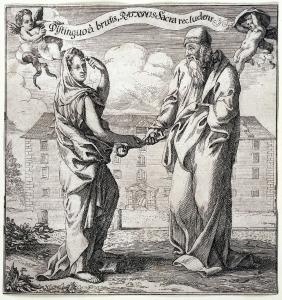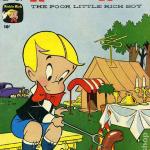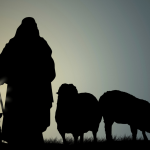 Last week the lectionary offered us a brief look at a few rather disjointed proverbs from late in the book, and I tried to suggest that such adages were never intended for universal truth, but were rather remembered as goads for further reflection, sayings that should tease a searcher into active thought. I also tried to show that too often such phrases have been used falsely as means for one human group to control another.
Last week the lectionary offered us a brief look at a few rather disjointed proverbs from late in the book, and I tried to suggest that such adages were never intended for universal truth, but were rather remembered as goads for further reflection, sayings that should tease a searcher into active thought. I also tried to show that too often such phrases have been used falsely as means for one human group to control another.
Today’s text from Proverbs is altogether different. In chapter 1 we are painted a portrait of Woman Wisdom, a wise guide for those who listen carefully to her, but a dangerous foe to those who shut their ears to her outcry. The figure of Woman Wisdom is a richly complex one whose roots reach back well before the compilation of the Book of Proverbs. The Hebrew word “wisdom” is chokmah, a feminine noun that means precisely what it says. It means “wisdom,” as opposed to “folly” or “simple-mindedness” or “scoffing,” all of which may be termed antonyms of the fuller implications of wisdom. Fools lack wisdom, the text regularly says. “Simpletons” are devoid of wisdom, we are often told. “Scoffers” (see Ps.1) have no wisdom and hence spend their days poo-pooing the right ways of living. Especially the wisdom literature of the Hebrew Bible ring multiple changes on these human dichotomies and make it plain that the search for wisdom is the appropriate way to live one’s life, while avoiding those other dangerous and death-dealing nouns.
Thus, wisdom is often merely a generalized noun, a goal for all right-thinking and right-acting people. But the Book of Proverbs takes the notion one important step further. It portrays wisdom as a woman; not only is the noun feminine in grammatical gender, but in Prov.1:20 the noun has the feminine marker added to it. It is here chokmoth, in effect Woman Wisdom, a personified feminine figure who is much more than an idea. She is here a loving and challenging woman who calls and urges all to follow her ways and to avoid the ways of her many adversaries. The search for wisdom has become a genuine human drama of life and death. Listen to how the author begins the play:
Woman Wisdom cries out in the street;
In the squares she raises her voice.
At the central corner, she preaches;
At the gates of the city she proclaims her words, “How long, simpletons, will you love being simple? How long will scoffing scoffers find delight? How long will fools hate knowledge?”
Note where the female preacher is to be found: in the streets, at the very busiest intersections of the city, at the gates of the city, that place in ancient Israel of judgment and decisions. There is a plaintiveness in her cry: “How long,” she wails, borrowing the shouts of several of the prophets as they admonished the people to cease their evil actions against the poor and helpless. But Woman Wisdom digs deeper into the lives of her people. They are more than evil, though the implication is plain that their embrace of foolishness and simple-mindedness is a sure path to evil and its terrible consequences.
But just what do these terms mean, these defining characteristics that Woman Wisdom urges her listeners to avoid? The simpleton is one who sees only on the surface of things, who is easily dissuaded from the deeper search for truth, who leads others to remain bound to the simplest solutions, the most common and quick examination of any subject. The scoffer is generally cynical about all things, one who finds evil everywhere, and decides that good is basically absent from all human affairs. The fool quite literally hates knowledge, especially knowledge that challenges those easily summarized conclusions of the simpleton, and those dark generalizations of the scoffer. In short, the task of Woman Wisdom is a very difficult one, both to urge the mass of humanity to turn from their easy conclusions and also to work harder at the steady search for truth.
Could anyone find a more salient and desperately needed figure for the time in which we are currently living? How much do we need Woman Wisdom in our day? I write during the week when two amazing and terrifying pieces of writing have appeared, both of which in effect name the president of the United States a simpleton, a scoffer, and a fool, one from whom we all need protection! Rather than a leader of the Free World, these writings, one a book, the other an anonymous editorial from a “senior administration official,” claim that Donald Trump is a deep threat to us all. Bob Woodward’s book, to be published next week, is titled “Fear,” and the editorial implies the same thing; we all should fear our president rather than look to him for leadership.
I have lived 72 years and have been a close observer of politics for perhaps 50 of those years. I lived through the Watergate morass, and I learned to fear Richard Nixon due to the revelations of his criminal behavior. Somehow, I find this situation of 2018 more dangerous, because Mr. Trump’s simplemindedness is well documented, and horribly celebrated by him and many of his followers. His scoffing is continual; for him the world is a very dark place with all media who oppose him nothing but “enemies of the people” and all facts that contradict his assertions little more than “fake news.” The two recent writings say in several different ways that he is a fool, who hates knowledge, who reacts against his perceived enemies far more than acting on behalf of the American people. These two pieces reaffirm what some earlier commentary has claimed, namely the president must be watched with care lest he sign a hasty document or demand a rash act on the whim of a moment. Apparently, he demanded in a fury that someone should assassinate Bashir al-Assad, president of Syria, but that order was countermanded by cooler heads.
Fortunately, Woman Wisdom is still at work though she is not often heard. “Turn around for my discipline, because I will pour out my spirit on you; I will make my words known to you” (Prov. 1:23). This preacher is relentless, and she will be heard! “Because I have called, and you have refused; I have stretched out my hand and no one paid attention,…I will laugh at your trouble, and will mock when panic strikes” (Prov.1:24,26). One should not imagine that the author of the Proverbs here is proposing merely a simple idea that fools and simpletons and scoffers always get what they deserve in some sort of universal calculus. I do not find it nearly so simple as that. Human history more than once indicates that sometimes fools thrive all too well and simpletons are lauded by many. Yet, in the main “upside down thinking kills the simple, and the complacency of fools destroys them” (Prov.1:32). The presidency of Donald Trump is the prime example of “upside down thinking,” riddled with nose thumbing at traditional morality and thoughtful actions. Further, his complacency in the face of continual questions about his demeanor, his intelligence, and his morality is the very essence of foolishness that can lead to destruction and death for him and unfortunately for us, the citizens who elected him.
Mr.Trump, as do all of us, need to cock our ears toward Woman Wisdom, for in her words truth may be found, foolishness may be avoided, scoffing may be rejected, and simplemindedness may be eschewed. I continually pray for the president and those who work for him, and part of my prayer is always that he will at last hear the call of Woman Wisdom, will heed her demand for the hard search for truth and knowledge. And I pray for those who continue to call his many shortcomings into the most serious question. Nothing less than his soul and our very lives are at stake.
(Images from Wikimedia Commons)















